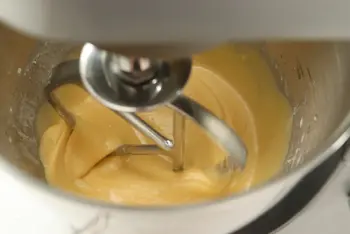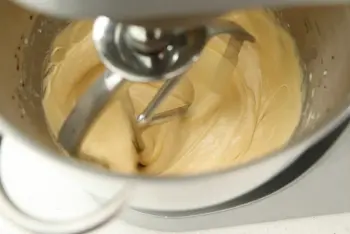Saint-Lô cake
A recipe from cooking-ez.com October 29th 20253,2705
For 1 cake, you will need:
- 1 100 g butter
- 2 50 g cream
- 3 2 tablespoons Calvados (apple liqueur) (optional)
- 4 125 g flour
- 5 125 g caster sugar
- 6 2 g salt
- 7 4 eggs
- 8 15 g yeast
- Total weight: 620 grams
Times:
| Preparation | Resting | Cooking | Start to finish |
|---|---|---|---|
| 30 min. | 2 hours | 35 min. | 3 hours 1 min. |
Step by step recipe
| 1 | In a small saucepan over low heat, melt 100 g butter, then remove from heat and add 50 g cream and 2 tablespoons Calvados (apple liqueur), stir and set aside. |  |
| 2 | In the bowl of a mixer, sift 125 g flour, add 125 g caster sugar, 2 g salt, 4 eggs and 15 g yeast. |  |
| 3 | Start the mixer on low speed to blend well. |  |
| 4 | Drizzle in the butter, cream and calvados mixture without stopping the mixer. |  |
| 5 | Mix well. |  |
| 6 | Increase the mixer speed, and let the dough beat for 10 minutes. Note: This is an essential step if you then want a light, airy cake. |  |
| 7 | Pour the dough into a buttered high-sided tin, cover with cling film or plastic sheeting, and leave to stand in a warm place for around 2 hours. |  |
| 8 | At the end of this time, you'll see that the dough has pushed through. |  |
| 9 | Preheat your oven to 180°C (360°F) and bake for 25-30 minutes. |  |
| 10 | Unmould as soon as you remove from the oven, otherwise the cake will stick to the tin, and leave to cool on a wire rack. |  |
Remarks
If using semi-salted butter, do not add salt at rstp=2.The Saint-Lô cake recipe is said to have been invented by a local restaurateur called "Le père Féret", chef of the Marignan restaurant.
The 10 minutes when the dough is beaten in step 6 are very important. If you don't do this (as in many recipes on the web), you'll end up with a dense cake that won't taste as good.
View this recipe : https://cooking-ez.com/desserts/recipe-saint-lo-cake.php
February 11th 2026.

